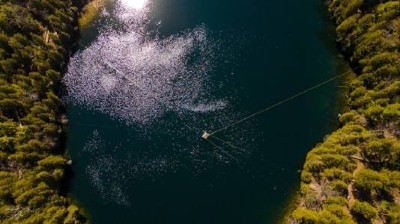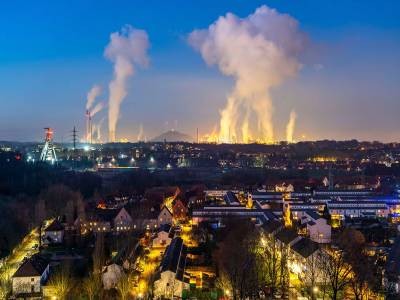[ad_1]
After 15 years of discussion and exploration, a committee of researchers has decided that the Anthropocene — generally understood to be the age of irreversible human impacts on the planet — will not become an official epoch in Earth’s geological timeline. The ruling, first reported by The New York Times, is meant to be final, but is being challenged by two leading members of the committee that ran the vote.
Twelve members of the international Subcommission on Quaternary Stratigraphy (SQS) voted against the proposal to create an Anthropocene epoch, and only four voted for it. That would normally constitute an unqualified defeat, but a dramatic challenge has arisen from the chair of the SQS, palaeontologist Jan Zalasiewicz at the University of Leicester, UK, and one of the group’s vice-chairs, stratigrapher Martin Head at Brock University in St Catharines, Canada.
This quiet lake could mark the start of a new Anthropocene epoch
In a 6 March press statement, they said that they are asking for the vote to be annulled. They added that “the alleged voting has been performed in contravention of the statutes of the International Commission on Stratigraphy” (ICS), including statutes governing the eligibility to vote. Zalasiewicz told Nature that he couldn’t comment further just yet, but that neither he nor Head had “instigated the vote or agreed to it, so we are not responsible for procedural irregularities”.
The SQS is a subcommittee of the ICS. Normally, there would be no appeals process for a losing vote. ICS chair David Harper, a palaeontologist at Durham University, UK, had confirmed to Nature before the 6 March press statement that the proposal “cannot be progressed further”. Proponents could put forward a similar idea in the future.
If successful, the proposal would have codified the end of the current Holocene epoch, which has been going on since the end of the last ice age 11,700 years ago, and set the start of the Anthropocene in the year 1952. This is when plutonium from hydrogen-bomb tests showed up in the sediment of Crawford Lake near Toronto, Canada, a site chosen by some geologists to be designated as a ‘golden spike’ as capturing a pristine record of humans’ impact on Earth. Other signs of human influence in the geological record include microplastics, pesticides and ash from fossil-fuel combustion.
But pending the resolution of the challenge, the lake and its plutonium residue won’t get a golden spike. Selecting one site as such a marker “always felt a bit doomed, because human impacts on the planet are global”, says Zoe Todd, an anthropologist at Simon Fraser University in Burnaby, Canada. “This is actually an invitation for us to completely rethink how we define what the world is experiencing.”
A cultural concept
Although the Anthropocene probably will not be added to the geological timescale, it remains a broad cultural concept already used by many to describe the era of accelerating human impacts, such as climate change and biodiversity loss. “We are now on a fundamentally unpredictable planet in ways that we have not experienced for the last 12,000 years,” says Julia Adeney Thomas, a historian at the University of Notre Dame, in Indiana. “That understanding of the Anthropocene is crystal clear.”
Are we in the Anthropocene? Geologists could define new epoch for Earth
The decision to reject the designation was made public through The New York Times on 5 March, after the SQS had concluded its month-long voting process, but before committee leaders had finalized discussions and made an official announcement. Philip Gibbard, a geologist at the University of Cambridge, UK, who is on the SQS, says that the crux of the annulment challenge is that Zalasiewicz and Head objected to the voting process kicking off on 1 February. The rest of the committee wanted to move forward with a vote and did so according to SQS rules, Gibbard says. “There’s a lot of sour grapes going on here,” he adds.
Had the proposal made it through the SQS, it would have needed to clear two more hurdles: first, a ratification vote by the full stratigraphic commission, and then a final one in August at a forum of the International Union of Geological Sciences.
Frustrated by defeat
Some of those who helped to draw up the proposal, through an Anthropocene working group commissioned by the SQS, are frustrated by the apparent defeat. They had spent years studying a number of sites around the world that could represent the start of a human-influenced epoch. They performed fresh environmental analyses on many of the sites, including studying nuclear debris, fossil-fuel ash and other markers of humans’ impact in geological layers, before settling on Crawford Lake.
Buried microplastics complicate efforts to define the Anthropocene
“We have made it very clear that the planet we’re living on is different than it used to be, and that the big tipping point was in the mid-twentieth century,” says Francine McCarthy, a micropalaeontologist at Brock University who led the Crawford Lake proposal1. Even though the SQS has rejected it, she says she will keep working to highlight the lake’s exceptionally preserved record of human activities. “Crawford Lake is just as great a place as it ever was.”
“To be honest, I am very disappointed with the SQS outcome,” says working-group member Yongming Han, a geochemist at the Institute of Earth Environment of the Chinese Academy of Sciences in Xi’an. “We all know that the planet has entered a period in which humans act as a key force and have left indisputable stratigraphic evidences.”
For now, the SQS and the ICS will sort out how to handle Zalasiewicz and Head’s request for a vote annulment. Meanwhile, scientific and public discussions about how best to describe the Anthropocene continue.
One emerging argument is that the Anthropocene should be defined as an event in geological history — similar to the rise of atmospheric oxygen just over two billion years ago, known as the Great Oxidation Event — but not as a formal epoch2. This would make more sense because geological events unfold as transformations over time, such as humans industrializing and polluting the planet, rather than as an abrupt shift from one state to another, says Erle Ellis, an ecologist at the University of Maryland Baltimore County in Baltimore. “We need to think about this as a broader process, not as a distinct break in time,” says Ellis, who resigned from the Anthropocene working group last year because he felt it was looking at the question too narrowly.
This line of thinking played a part in at least some of the votes to reject the idea of an Anthropocene epoch. Two SQS members told Nature they had voted down the proposal in part because of the long and evolving history of human impacts on Earth.
“By voting ‘no’, they [the SQS] actually have made a stronger statement,” Ellis says: “that it’s more useful to consider a broader view — a deeper view of the Anthropocene.”
[ad_2]
Source Article Link




